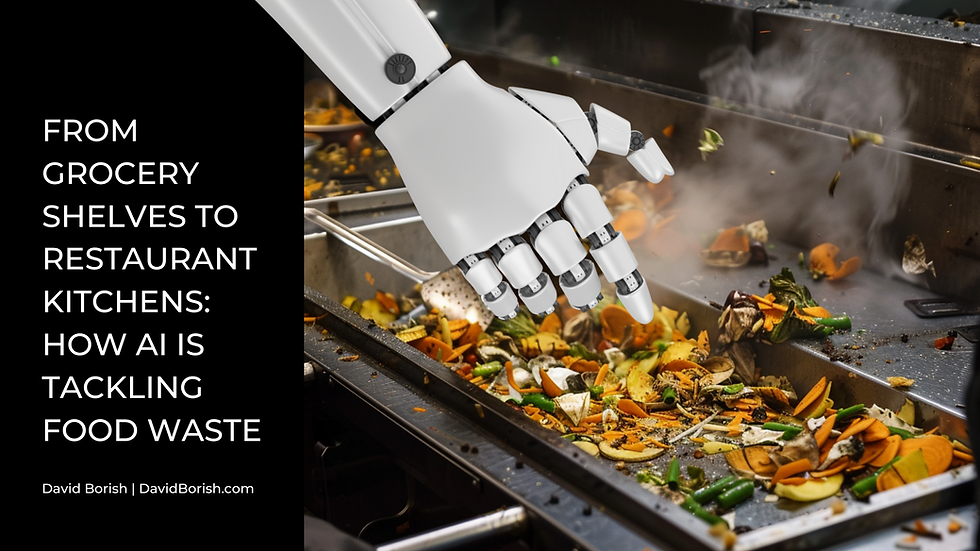From Grocery Shelves to Restaurant Kitchens: How AI is Tackling Food Waste
- David Borish

- Apr 9, 2024
- 2 min read

The food industry has long grappled with the issue of food waste - a problem that not only eats into profits but also exacts a heavy environmental toll. According to the United Nations Environment Program, a staggering 1 billion metric tons of food went to waste globally in 2022 alone, accounting for 8-10% of total greenhouse gas emissions. However, the emergence of artificial intelligence (AI) is offering new hope in the fight against food waste.
One company at the forefront of this AI revolution is Winnow. Their innovative technology uses cameras installed above restaurant garbage bins to identify and categorize discarded food items. By feeding this visual data into a sophisticated algorithm, Winnow's system can distinguish between valuable food (like a half pan of lasagna) and unavoidable waste (like a banana peel). This granular insight allows restaurants to pinpoint sources of waste and adjust accordingly. For example, a group of Hilton Hotels using Winnow's tool discovered that many of their breakfast pastries were too large and frequently discarded - a finding that prompted portion size adjustments.
On the retail front, companies like Afresh are leveraging AI to optimize supermarket inventory management. By analyzing up to six years of sales data for every product in a store's fresh foods section, Afresh's AI tool can predict demand with remarkable precision. It takes into account factors like seasonality, price sensitivity, and even correlated purchases (e.g., increased egg sales usually correspond to more bell pepper purchases as shoppers make omelets). Armed with these AI-generated insights, store managers can fine-tune their ordering to minimize overstock and spoilage. As Suzanne Long, sustainability chief for Albertsons (which uses Afresh), notes, this granular precision is especially valuable given the scarcity of experienced store managers.
Other AI-powered solutions are tackling food waste from different angles. Startups like Apeel and Mori offer protective coatings that slow produce spoilage, while apps like Flashfood and Too Good to Go connect consumers with discounted surplus food from grocery stores and restaurants.
While AI is not a silver bullet for the complex issue of food waste, it is proving to be a powerful tool in the food industry's sustainability arsenal. By pinpointing inefficiencies, optimizing inventory, and extending shelf life, AI is helping to close the gap between food production and consumption. And in a world where one-third of food produced goes uneaten, that increased efficiency is more critical than ever. As the food industry continues to embrace AI, we can expect to see significant strides in waste reduction - a win for both the bottom line and the planet.
If you or your organization would like to explore how AI can enhance productivity, please visit my website at DavidBorish.com. You can also schedule a free 15-minute call by clicking here




_edited.png)
Comments